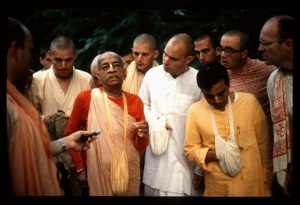SB 9.14.46: Difference between revisions
m (1 revision(s)) |
No edit summary |
||
| Line 1: | Line 1: | ||
{{info | {{info | ||
|speaker= | |speaker=Śukadeva Gosvāmī | ||
|listener=King | |listener=King Parīkṣit | ||
}} | }} | ||
[[Category:Srimad-Bhagavatam - Canto 09 Chapter 14]] | |||
[[Category:Bhagavatam Verses Spoken by Sukadeva Gosvami - Vanisource|091446]] | |||
<div style="float:left">'''[[Srimad-Bhagavatam]] - [[SB 9|Ninth Canto]] - [[SB 9.14: King Pururava Enchanted by Urvasi|Chapter 14: King Purūravā Enchanted by Urvaśī]]'''</div> | |||
<div style="float:right">[[File:Go-previous.png|link=SB 9.14.44-45]] '''[[SB 9.14.44-45]] - [[SB 9.14.47]]''' [[File:Go-next.png|link=SB 9.14.47]]</div> | |||
{{RandomImage}} | |||
==== TEXT 46 ==== | ==== TEXT 46 ==== | ||
<div | <div class="verse"> | ||
tasya nirmanthanāj jāto | :tasya nirmanthanāj jāto | ||
jāta-vedā vibhāvasuḥ | :jāta-vedā vibhāvasuḥ | ||
trayyā sa vidyayā rājñā | :trayyā sa vidyayā rājñā | ||
putratve kalpitas tri-vṛt | :putratve kalpitas tri-vṛt | ||
</div> | </div> | ||
| Line 17: | Line 22: | ||
==== SYNONYMS ==== | ==== SYNONYMS ==== | ||
<div | <div class="synonyms"> | ||
''tasya''—of Purūravā; ''nirmanthanāt''—because of interaction; ''jātaḥ''—was born; ''jāta-vedāḥ''—meant for material enjoyment according to the Vedic principles; ''vibhāvasuḥ''—a fire; ''trayyā''—following the Vedic principles; ''saḥ''—the fire; ''vidyayā''—by such a process; ''rājñā''—by the King; ''putratve''—a son's being born; ''kalpitaḥ''—it so became; ''tri-vṛt''—the three letters ''a-u-m'' combined together as ''oṁ''. | |||
</div> | </div> | ||
| Line 24: | Line 29: | ||
==== TRANSLATION ==== | ==== TRANSLATION ==== | ||
<div | <div class="translation"> | ||
From Purūravā's rubbing of the araṇis came a fire. By such a fire one can achieve all success in material enjoyment and be purified in seminal birth, initiation and in the performance of sacrifice, which are invoked with the combined letters a-u-m. Thus the fire was considered the son of King Purūravā. | From Purūravā's rubbing of the araṇis came a fire. By such a fire one can achieve all success in material enjoyment and be purified in seminal birth, initiation and in the performance of sacrifice, which are invoked with the combined letters a-u-m. Thus the fire was considered the son of King Purūravā. | ||
</div> | </div> | ||
| Line 31: | Line 36: | ||
==== PURPORT ==== | ==== PURPORT ==== | ||
<div | <div class="purport"> | ||
According to the Vedic process, one can get a son through semen (śukra), one can get a bona fide disciple through initiation (sāvitra), or one can get a son or disciple through the fire of sacrifice (yajña). Thus when Mahārāja Purūravā generated the fire by rubbing the araṇis, the fire became his son. Either by semen, by initiation or by yajña one may get a son. The Vedic mantra oṁkāra, or praṇava, consisting of the letters a-u-m, can call each of these three methods into existence. Therefore the words nirmanthanāj jātaḥ indicate that by the rubbing of the araṇis a son was born. | According to the Vedic process, one can get a son through semen (''śukra''), one can get a bona fide disciple through initiation (''sāvitra''), or one can get a son or disciple through the fire of sacrifice (''yajña''). Thus when Mahārāja Purūravā generated the fire by rubbing the ''araṇis'', the fire became his son. Either by semen, by initiation or by ''yajña'' one may get a son. The Vedic mantra ''oṁkāra'', or ''praṇava'', consisting of the letters ''a-u-m'', can call each of these three methods into existence. Therefore the words ''nirmanthanāj jātaḥ'' indicate that by the rubbing of the ''araṇis'' a son was born. | ||
</div> | </div> | ||
__NOTOC__ | |||
<div style="float:right; clear:both;">[[File:Go-previous.png|link=SB 9.14.44-45]] '''[[SB 9.14.44-45]] - [[SB 9.14.47]]''' [[File:Go-next.png|link=SB 9.14.47]]</div> | |||
__NOTOC__ | |||
__NOEDITSECTION__ | |||
Revision as of 11:28, 16 May 2021

A.C. Bhaktivedanta Swami Prabhupada
TEXT 46
- tasya nirmanthanāj jāto
- jāta-vedā vibhāvasuḥ
- trayyā sa vidyayā rājñā
- putratve kalpitas tri-vṛt
SYNONYMS
tasya—of Purūravā; nirmanthanāt—because of interaction; jātaḥ—was born; jāta-vedāḥ—meant for material enjoyment according to the Vedic principles; vibhāvasuḥ—a fire; trayyā—following the Vedic principles; saḥ—the fire; vidyayā—by such a process; rājñā—by the King; putratve—a son's being born; kalpitaḥ—it so became; tri-vṛt—the three letters a-u-m combined together as oṁ.
TRANSLATION
From Purūravā's rubbing of the araṇis came a fire. By such a fire one can achieve all success in material enjoyment and be purified in seminal birth, initiation and in the performance of sacrifice, which are invoked with the combined letters a-u-m. Thus the fire was considered the son of King Purūravā.
PURPORT
According to the Vedic process, one can get a son through semen (śukra), one can get a bona fide disciple through initiation (sāvitra), or one can get a son or disciple through the fire of sacrifice (yajña). Thus when Mahārāja Purūravā generated the fire by rubbing the araṇis, the fire became his son. Either by semen, by initiation or by yajña one may get a son. The Vedic mantra oṁkāra, or praṇava, consisting of the letters a-u-m, can call each of these three methods into existence. Therefore the words nirmanthanāj jātaḥ indicate that by the rubbing of the araṇis a son was born.